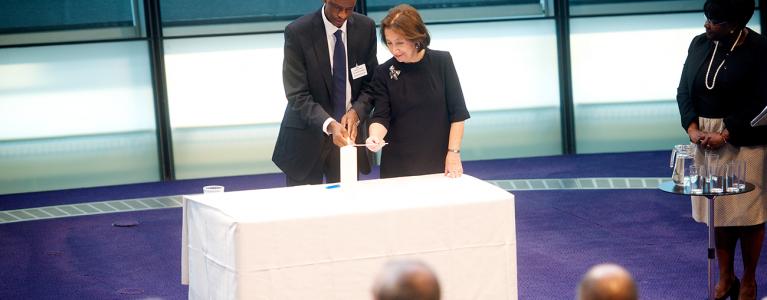
The Chair of the London Assembly, the Mayor of London and Members of the Assembly today joined MPs, Rabbi Raphy Garson, Holocaust survivors and other Londoners at City Hall’s annual Holocaust Memorial Day ceremony.
Organised to remember victims of the Holocaust and other acts of genocide, and marking 71 years since the liberation of Auschwitz-Birkenau, this year’s theme for Holocaust Memorial Day is ‘Don’t Stand By’. As well as honouring the courageous individuals and communities who helped victims of Nazis, and subsequent genocides, it emphasises the need to stand up to persecution.
The Mayor gave a reading from Holocaust survivor Elie Wiesel’s 1986 Nobel Peace Prize acceptance speech and Rabbi Raphy Garson also addressed the audience with a memorial prayer. Jennette Arnold OBE AM, Chair of the London Assembly, opened the event.
Chair of the London Assembly, Jennette Arnold OBE AM, said:
‘In October last year, I was honoured to travel to Auschwitz-Birkenau as a guest of the Holocaust Educational Trust. For many of us, our understanding of the Holocaust is largely focused on the millions that perished in the gas chambers. ‘How was this even possible?’ is the question that continues to be asked. Sadly, the simple answer is because too many stayed silent. How appropriate then that the theme of Holocaust Memorial Day 2016 is ‘Don’t Stand By.’
The Mayor of London, Boris Johnson, said:
‘Today we remember the millions of people who lost their lives in both the Holocaust and other appalling acts of genocide. Recent events here in London and in our sister city Paris, as well as other parts of the world, remind us of the importance of cherishing and defending freedom and tolerance. It is vital that we keep the memory of the Holocaust alive and learn from the atrocities of the past.’
Rabbi Raphy Garson, of Elstree and Borehamwood, said:
‘Evil is a reality that exists in our world, which if left unchecked, can destroy humanity. Mankind needs to be alert to the existence of evil in others and then understand it is up to us to uproot it. Today's event resonates with the importance of "Zachor", a word in Hebrew which means the duty of remembrance itself. For as we remember the millions of victims of the Shoah and other genocides, we must reflect upon the fact that mass murder is not a matter of abstract statistics. For every person there is a name and identity, whose dreams and aspirations were destroyed. This abiding imperative teaches that we are each, wherever we are, the guarantors of each other’s destiny.
‘The world can no longer remain indifferent, because doing so took us down the road to the unspeakable genocides in Rwanda, Darfur, Syria and sadly many others. Holocaust Memorial Day reminds us that when the moment comes we need to protest and speak out! The danger of silence and the consequences of indifference behoves us all to the responsibility to protect.’
Those gathered also heard emotional accounts from Holocaust survivor Hannah Lewis and Jean Baptiste Kayigamba, who survived the Rwandan Genocide.
In 1943, six year old Hannah and her family were moved to a work camp in Adampol village, a few miles from her hometown of Wlodawa in Poland. Her father and his cousin escaped from the camp and joined the Partisans. Hannah remained in Adampol where her mother was shot dead by the Einsatzgruppen. Hannah was finally liberated in 1945 by a Russian soldier who picked her out of a trench. After the war, Hannah’s father found her and they lived in Lodz before she was brought to live with her great aunt and uncle in London in 1949.
Jean Baptiste is a Tutsi and former journalist who survived the 1994 Rwandan Genocide. He fled his home in Rwanda three years ago, and says that because the media in his home country is largely state-controlled, journalists who criticised the government became targets for arrest or death threats. Now, having been granted asylum in the UK, he has been unable to find permanent work. He actively speaks out in his community to try to educate others about prejudices experienced by asylum seekers.
The ceremony also featured London schoolchildren, who presented their 'Lessons from Auschwitz' project, delivered by the Holocaust Educational Trust, and music by Daniel Gouly and Josh Middleton from the Jewish Music Institute.
Read the full address made by the Chair of the London Assembly.
Notes to editors
- Watch the webcast of the event here
- The Holocaust Educational Trust’s Lesson’s from Auschwitz project conducts seminars with post-16 students. The four-part course incorporates a one-day visit to Auschwitz-Birkenau.
- As well as investigating issues that matter to Londoners, the London Assembly acts as a check and a balance on the Mayor.
For media enquiries, please contact Alison Bell on 020 7983 4228 or 07887 832 918. For out of hours media enquiries, call 020 7983 4000 and ask for the London Assembly duty press officer. Non-media enquiries should be directed to the Public Liaison Unit on 020 7983 4100.